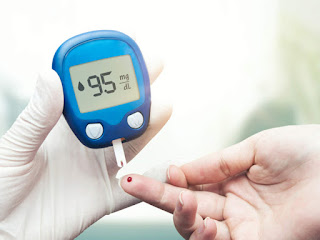Diabetes Symptoms & Diagnosis
Diabetes Overview
Diabetes is a number of diseases that involve problems with the hormone insulin. Normally, the pancreas (an organ behind the stomach) releases insulin to help your body store and use the sugar and fat from the food you eat. Diabetes can occur when the pancreas produces very little or no insulin, or when the body does not respond appropriately to insulin. As yet, there is no cure. People with diabetes need to manage their disease to stay healthy.
Diabetes Symptoms & Diagnosis
Diabetes is a disorder of metabolism -- the way our bodies use digested food for growth and energy. There are three main types of diabetes: type 1, type 2, and gestational diabetes.
- Signs & Symptoms of DiabetesThe warning signs of diabetes can be so mild that you don't notice them. That's especially true of type 2 diabetes. With type 1 diabetes, the symptoms usually happen quickly, in a matter of days or a few weeks.
- Risk Factors for DiabetesOne of every four people with diabetes doesn't know they have it. See if your risk of having the disease is high.
- What to Expect at the Doctor's OfficeDiabetes and prediabetes are diagnosed with a fasting plasma glucose test, oral glucose tolerance test, or random plasma glucose test.
- Oral Glucose Tolerance TestingAlthough doctors don't routinely use it anymore, the oral glucose tolerance test is the gold standard for diagnosing type 2 diabetes. It's still commonly used to diagnose gestational diabetes, a condition that a woman can get while pregnant.
- Hemoglobin A1c (HbA1c) TestingThe hemoglobin A1c test, also called HbA1c, glycated hemoglobin test, or glycohemoglobin, is an important blood test that shows how well your diabetes is being controlled.
- Diabetes and Urine TestingTwo simple tests that check your urine can help you and your doctor watch for kidney disease and severe high blood sugar.
Diabetes Treatments
Diabetes is a disorder of metabolism -- the way our bodies use digested food for growth and energy. There are three main types of diabetes: type 1, type 2, and gestational diabetes.- Understanding Your Diabetes Treatment OptionsHow do you know if you have diabetes? Learn what's involved in the diagnosis.
- Your Diabetes Care TeamDifferent doctors can help you manage different aspects of your diabetes. Find out who you need on your team.
- Insulin Treatment: The BasicsInsulin is a hormone that controls blood sugar. There are many types of insulin used to treat diabetes. Learn about the most common, side effects, storage tips, and more.
- Types of InsulinMany forms of insulin treat diabetes, including rapid-acting, short-acting, intermediate-acting, long-acting, and pre-mixed. Learn which type is best for your diabetes.
- Insulin Questions for Your DoctorHas your doctor prescribed insulin to help manage your type 1 or type 2 diabetes? You’ll want to know how and when to take it, what side effects could happen, and what other changes you may need to make.
- Non-Insulin Diabetes InjectablesInsulin isn't the only type of injectable diabetes medicine your doctor might prescribe for you. Learn about other injectable medications.
- Oral Medications for DiabetesWhen you think about diabetes drugs, you may think of insulin or other medications that you get from a shot or a pump. But there are others that you take as a pill or that you inhale.





Comments
Post a Comment